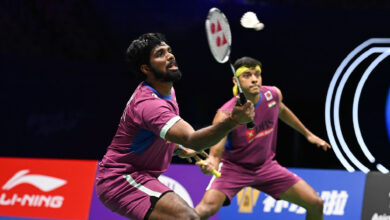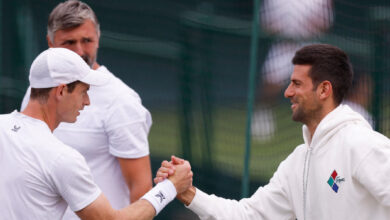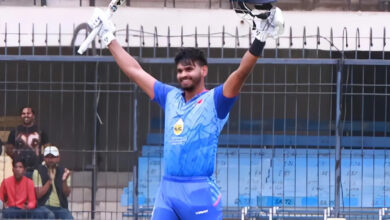Devotion and courage: David Miller’s rise from talented teen to international match-winner

When David Miller was around three years old, his father Andrew gifted him a plastic golf set. He gently rolled a ball at the toddler, and David, with a fluid straight swing of the miniature club, swung it over his father’s head. “I was expecting him to swing across the line, as kids of his age do. Never imagined that he would hit straight over my head,” Andrew narrates to the Indian Express.
He screamed in excitement. His wife offered a word of caution. “She was like wait, try once more. Maybe it was a fluke. So I bowled once more around the same area. The result was the same, straight over my head,” he says, his voice seemingly recapturing the raw excitement that he felt nearly three decades ago. He blurted out to his wife: “One day, he would play for South Africa. I did not mean it as a prophecy then but the thought came instinctively to me,” he says.
🚨 Limited Time Offer | Express Premium with ad-lite for just Rs 2/ day 👉🏽 Click here to subscribe 🚨
Soon, young David set the golf set aside and instead latched onto his father’s cricket bat. Andrew, a racehorse auctioneer, was active in Natal’s club cricket circuit, proudly tells about his lone L A appearance for the province, and he naturally began to drag his son along for practice.Best of Express PremiumPremiumPremiumPremiumPremium
He inss that he did not thrust cricket on David; rather cricket thrust itself on David. “Everything happened organically, and yes, he grew up in an environment with lots of cricket and cricketers, some of them were coaches and some of them were active players too, guys like Graham Ford, Robin Smith and Harry Brown (his first coach),” he says.
At the Miller household in Pietermaritzburg, national and first-class cricketers used to drop for a Sunday afternoon braai or an evening drink. Andrew also ensured David was put in schools reputed for cricket. Clifton in the Midlands town, for whom he rattled out a 50-ball hundred when he was just 10, and then Maritzburg College, the alma mater, among other luminaries, that of Kevin Pietersen.
When he shifted to Durban, he took his son along, so that he could enrol him at Ford’s coaching academy. And David had no other thought or plan about his life other than cricket. “Just cricket. He was fully devoted to the game that we have never discussed an alternative career plan,” he says.
Playing with his father’s peers toughened up his game, even as he made a habit of playing in levels beyond his age-group. One day, for a club game, the father-son pair walked out to face the new-ball against a team full of men his father’s age. “He was just 13, but was bold and firm. I was confident because I have seen his comfort-level against the bowlers of my team,” he says.
David Miller with his father, Andrew.
But there was a hitch for Andrew. “I had told my wife that I would retire the day my son starts playing the game at club level. Now she was asking me to retire, but I found an excuse that I meant when my younger son (fours years younger to David) began playing club cricket. Anyway, I managed to play the game till I was 47 and had some lovely partnerships with David. But he would always hit straight, whereas my favourite area was the cow cordon,” he says, chuckling.
But it was not the last time he turned up for a level beyond his age and proved that he belonged there.
Courage from an early age
The image remains fresh in the mind of Mike Bechet, Miller’s coach at the Maritzburg College. Miller lay sprawled on the pitch, grimacing and writhing in pain after a short-pitched ball from a strapping fast bowler had cannoned onto his chest during an U-19 game between Maritzburg and St John’s.
Even 17 years later, the coach remembers his name. “It was Scott Spedding, a nasty opening fast bowler,” he dusts up the memory to this newspaper, helped undoubtedly that Spedding soon switched the sport and country and played rug for France.
“The world around me spun. The decision to thrust a 14-year-old debutant into an U19 game was not a popular one amongst the school leadership. That too, he was opening against a strong team.” “Did I err in my judgement?” his brain buzzed.
David Miller and his Maritzburg College coach Mike Bechet (left).
His judgement was based on two cues that wizened old coaches probe in their wards. Natural athleticism and hand-eye coordination, more than technique. Miller had both, he says, and in so generous amounts, that he evoked memories of another product of his, Jonty Rhodes. “My gut feeling was that it was the right thing to try and fast track him. He was totally bossing the bowlers of his age,” he remembers.
But the time the day’s play ended, Bechet spotted another trait that stamped his unfolding prodigy. Courage. A few seconds later, as the coach and others wondered whether they needed to rush him to the hospital, he scrambled onto his feet. During a break, the coach even asked him whether he was fine to bat. “David just stared back at me with a stern smile, and I knew what was running through his mind,” he says.
An hour later, to the loud applause of his teammates and adversaries, he returned to the pavilion. “At that precise moment, I knew that he was destined for bigger things in his career,” he says. Just like his father sensed that day he swung the golf ball over his head.
🏆❤️ pic.twitter.com/VsH8z8MOMH
— David Miller (@DavidMillerSA12) May 30, 2022
It did not take much time for the coaches or peers to be convinced of his potential. “Not just talent, he was incredibly humble and determined. Dave’s natural athleticism and physicality saw to it that he did start clearing the boundary ropes as he grew older. He had a 360-degree game and was always the prize wicket for the opposition. And that was the time before T20 became mainstream,” he says.
the end of Miller’s term, they were more like a father and son, and at times, he had to be stern. “I was his boarding housemaster at Maritzburg College and unintentionally caught him bunking out twice in his final year. The second time was right at the end of the year so he had to leave the boarding house!” he says.
Six years after he lay sprawled on the deck, he was draped in the Protea robes, and playing county cricket for Yorkshire, alongside a fluffy-haired Joe Root, and on the payroll of Kings XI Punjab, rubbing shoulders with his idols, Matthew Hayden and Adam Gilchr, and soon setting the IPL on fire himself. He blasted into the psyche of cricket-watchers with a 38-ball 101 (against AB’s RCB) in 2012 and reeled out sentences with verbal flourish: “If it’s in the V, it’s in the tree. If it’s in the arc, it’s out of the park.”
And far away in Pietermaritzburg, there were two proud men. His father and the coach.
Born fighter
Neither the bright eyes nor the sharply contoured face is a mirror to Miller’s mind. The most ecstatic moments are encountered with nothing more than a reluctant smile; the most heartbreaking hours are met with a stoic glare. “You don’t know whether he has scored a hundred or gone for a duck. He won’t brag about a hundred or mourn a zero. He takes both as part of life and moves on. Success doesn’t get into his head. Failures don’t push him to desperation,” says Miller senior.
There were two rare exceptions. His father has never seen him as devastated as he was when he was left out of the squad for the 2011 World Cup. Later, after a difficult 2016— a dry spell of runs, axing from the national team, ouster as Kings XI Punjab captain after just five games in charge, a virus infection that saw him hop from one hospital to the other and losing 10kg in months, relegated to A team duties and mindlessly trolled on social media—he deliberated on quitting the game.
After another failure during the A tour to Australia, he plunged into a dark corner of the room. “I was in a really dark space at that time. I thought I would quietly quit the game altogether. There were so many things going through my brain and I was frustrated,” he says in a David Miller interviews Himself show, shot during his Rajasthan Royals tenure last year.
Sorry #RoyalsFamily 🤷♂️
— David Miller (@DavidMillerSA12) May 24, 2022
His father tried to put things in perspective for him. “When you look at a successful career, you fail rather than succeed in most innings. Take the example of any great cricketer, you realise this. The thing is you have to keep working hard to get through difficult phases and then latch onto the opportunities.
Bechet too stepped deep into the heart of his malaise. “Dave really wanted to play Test cricket but was never given the opportunity and I do believe that this was foremost on his mind during that time as he saw other lesser players (in my opinion) getting opportunities ahead of him. I was very aware that this was sitting at the forefront of his mind, and something that he couldn’t control,” he remembers.
So he suggested that he set up a meeting with the then convenor of the Protea selection panel, Linda Zondi. He did. “But nothing positive emanated from that meeting so it was time to let that dream go. But I always believed in him and that he would bounce back, because he is a fighter. I reminded him of that day when he was felled the short ball,” he says.
Fight Miller did. He realised the need to unwind and scatter his single-minded focus from cricket. He went out in the ocean, which he says was always his passion. He started golfing more often and squeezed in time to visit the Kruger National Park.
“It’s really important to look after your mental state during your career and it is something that moving forward I am going to pay a lot more attention to. Cricket is a sport that so much can go against you that you need to have time to reflect,” he then told sport24.co.za.
Miller was also a victim of perception. He was no AB de Villiers with superhuman intelligence to pick boundaries; he was no Kieron Pollard to muscle sixes from the first ball. He is a batsman in the classical mould, who needs time at the crease before going ballic. The coach, banteringly blames himself for the method that’s entrenched in him.
“I had to remind him often to “not get bored” and to “be patient” when batting. Maybe that’s why he still scratches around in the initial stages of his innings’ currently – he always takes time to settle into his comfort zone/rhythm, knowing that he can up the ante once settled. This is why he is sometimes criticised in his own country,” he says.
But this season, bestowed the freedom to get the eye in before unfurling the big strokes, he blossomed and finished games that seemed beyond the Titans’ grasp. The unbeaten 38-ball 68 against Rajasthan Royals in the qualifier was a classic example. He shelved all his big strokes and nudged his way to five off 10 balls. He attempted–and succeeded–his first boundary only off the 15th ball he faced. Then with three typically flat sixes, he wrapped up the chase. “In the past, I was trying to hit the very first ball out of the park, and when I could not, the frustration just kept building.” Miller would admit.
A clearer mind, a deeper understanding of his game, and a more daring approach against spinners has helped him morph into the world-beater his coach and father had envisioned years ago. Miller’s moments of fragility had long vanished, and those early memories begin to flood them—him swinging the plastic ball over Andrew’s head or him recovering himself from a blow on the chest, and producing a brave knock, and how their instinctive impressions about Miller have turned prophetic.







